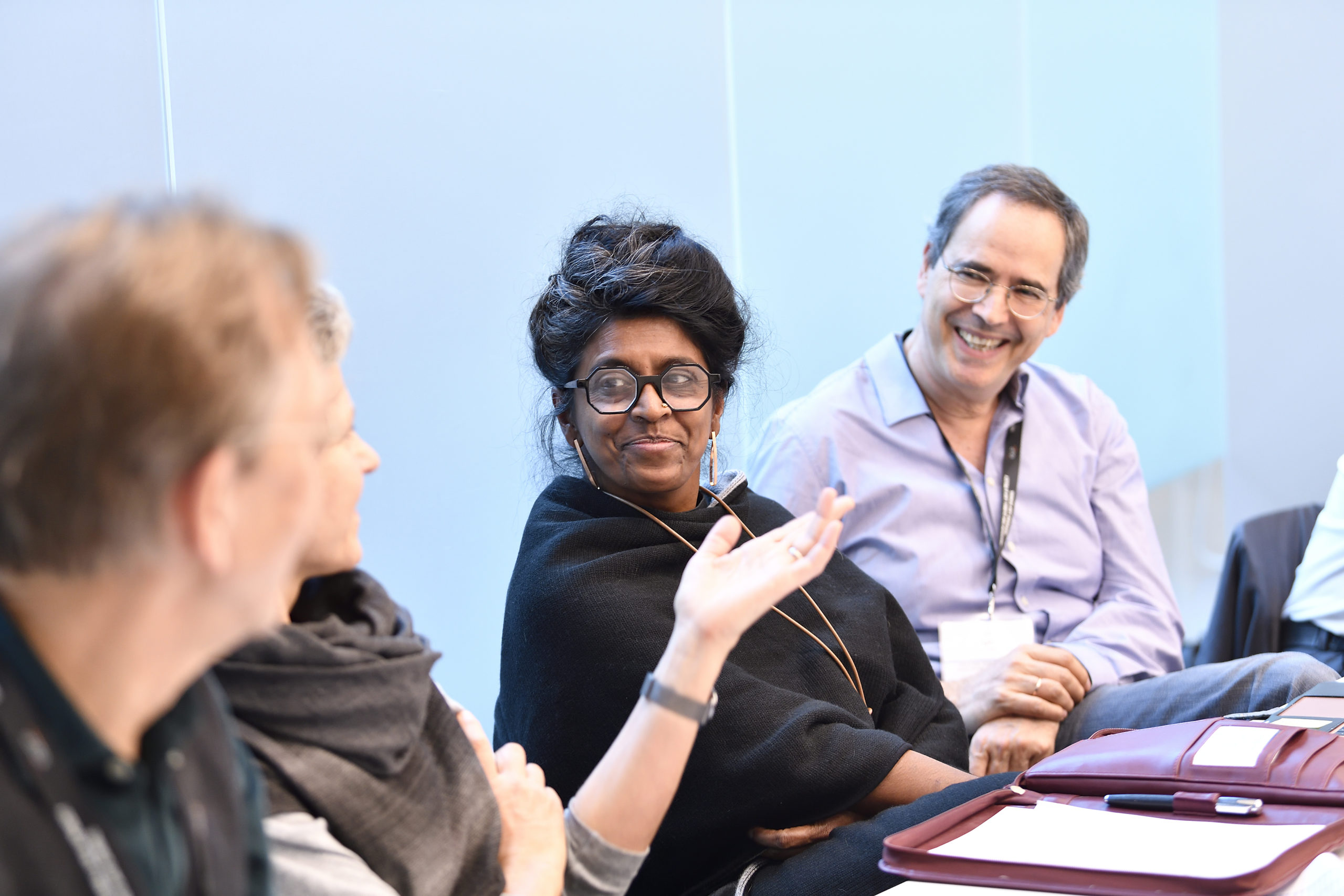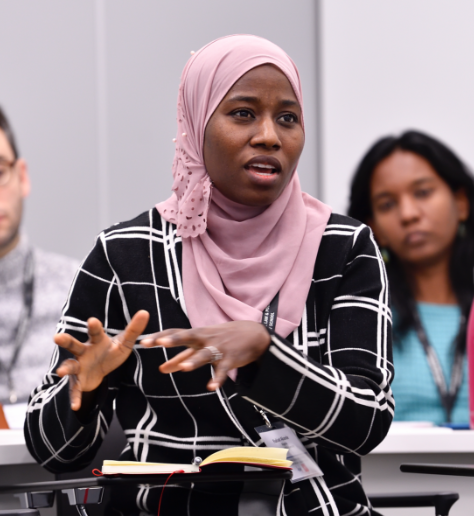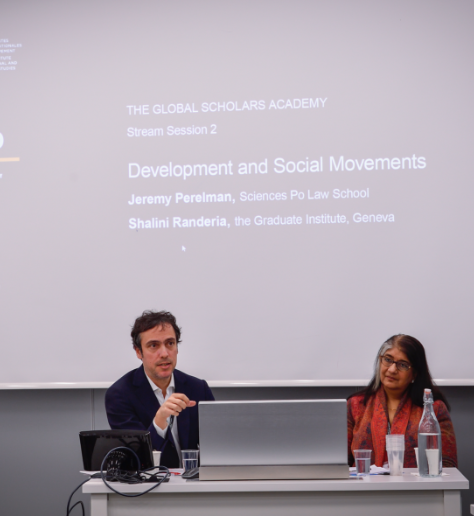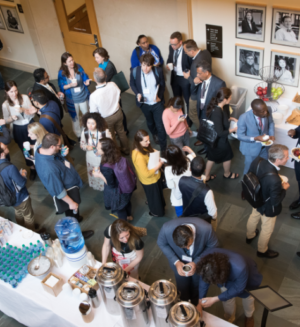IGLP Signature Events
The Global Scholars Academy

Our signature initiative, The Global Scholars Academy is an advanced, intensive residential experience designed to enable junior faculty and postdoctoral scholars to engage in sustained, interdisciplinary, peer-to-peer collaboration under the close mentorship of research faculty drawn from the world’s top universities. The Academy is open by application to advanced junior scholars working to understand and map the levers of political, economic, and legal authority in the world today. We particularly welcome applications from scholars from the Global South and those working on policy challenges of concern to communities in the Global South.
IGLP: The Conference

Through IGLP: The Conference, the Institute encourages academic collaboration among young scholars from across the world, aiming to support a network of scholars and policy makers who share our belief that ideas matter, and our commitment to new voices and viewpoints for thinking about global governance, social justice and economic policy. IGLP: The Conference is held every other June at Harvard Law School and is open to all those who are interested in pursuing new thinking about law and global policy, including those who weare e new to our network as well as IGLP alumni and friends. Our goal is to provide an opportunity for scholars connected to the Institute to return to Cambridge to present their research, to connect with peers from across the globe, and to find new opportunities for collaborative research with other innovative scholars.
The Conference is held at Harvard Law School and is open to all those who were interested in pursuing new thinking about law and global policy, including those who are new to our network, as well as IGLP alumni and friends.
IGLP Pro-Seminars

The IGLP has convened Pro-Seminars designed for small groups of scholars to engage in collaboration aimed towards publication. IGLP Pro-Seminars typically meet in June and have brought together between ten and fifteen active scholars, by invitation and application, working on a common topic. Pro-Seminars typically meet for 3-4 days at Harvard to brainstorm their evolving scholarly writing and advance their work towards publication.
Past Pro-Seminars
Convener: Chris Desan
The Pro-Seminar on Re-theorizing Liquidity focused on “Critical Approaches to Monetary Design.” Both neoclassical economics and modern portfolio theory curtail attention to the design of money and credit. But the financial crisis of 2008 was, in many ways, a monetary event. It was only the most recent indication that the design of money matters enormously; we could point as well to the relationship between asset bubbles and credit, the fragility of systems built on short-term liabilities, the distributive impact of government rescues, the centrality of circulating public bonds as private collateral, the paralysis of policy given the current repertoire of “monetary” and “fiscal” tools, the challenge that central banks as opaque authorities posed for systems with democratic aspirations, and the continued dearth of critical imagination concerning economic institutional design.
The Pro-Seminar brought together scholars and students from law, economics, and history who approached the monetary system with a critical perspective. The aim was to develop both analytic capacity to understand the current order and constructive thought about its revision.
The Pro-Seminar:
- Explored the differences and commonalities between the different traditions that were driven by a fiscal understanding of money, and its modern and historical relationship to the banking system;
- Considered how the insights of modern monetary theory, of stock-flow consistent modeling, of Minsky’s instability principles, and of careful institutional analysis might have illuminated issues of economic institutional design;
- Discussed the blind spots created by the dominant paradigms in contemporary economics and finance;
- Assessed the possibility that inter-disciplinary approaches, including the unique competency of lawyers in institutional design, might have opened up curricular space for a re-invigorated approach to fundamental issues of money and economic structure.
The Pro-Seminar was based on an exchange of readings solicited in advance from participants. Sessions were focused by topic and included short presentations or commentary meant to open discussion on the subject matter. The aim was to identify both common territory and divergences among the approaches (theoretical, methodological, etc.) taken by participants.
Conveners: Duncan Kennedy, Kerry Rittich, and Justin Desautels-Stein
This pro-seminar addressed the broad topic of “Contemporary Legal Thought,” and invited participants to contribute to the elaboration, evaluation, and critique of the idea. Is there such a thing as a contemporary moment in our legal consciousness? If so, how do we know it? And if we can know it, do we like who we are? Does Contemporary Legal Thought represent a triumphant march through history? Is it merely a momentary reflection of personal preferences and political projects? Is it more or less than this? In bringing together a body of expert work on the topic, among the themes addressed were:
- The “relative autonomy question.” In accordance with critical orthodoxy, there was a tendency to describe legal institutions and ideas as having a dynamic, dialectical or constitutive relationship to economic activity. Yet despite this description (suggesting mutability and variability) the institutions and ideas of law were often seen as playing a relatively constant formative role in shaping economic relations. Assuming this was right (was it?) one wondered whether a key aspect of contemporary law might not be the thoroughgoing infusion and colonization of legal ideas and institutions through the medium of economics, economism, commodification, etc.
- The “neoformalist reaction.” Within contemporary legal thought, one of the more interesting/puzzling questions concerned the neo-formalist side of contemporary legal thought (highly evidenced for instance, in U.S. in constitutional law and human rights law). The neoformalist tendency was clearly recognized. What were its roles and provenances? And how did it succeed within the academy given its transparently dogmatic and brutish character—or was that its appeal? (“Transparent” here being the key distinguishing term). And how odd it was—given its unavoidably interstitial and randomizing effect while nonetheless claiming to be foundational. Finally, if there had been a neoformalist reaction to the evolutionary functionalism of the mid-20th century, was there any evidence of a “neo-functionalist” reaction to neoformalism?
- The Postmodern Betrayal. Some critics of postmodernism (this corresponded to the residual presence of partisans of the social) often claimed that the postmodern tendency by emphasizing this—call it decenteredness—effectively reproduced and intensified political paralysis and resulted in “demobilization.” The postmoderns meanwhile responded with the usual incredulity: “Right, I see and you are mobilized, are you?” Were we building towards a new aesthetics of politics or simply witnessing its demise? (Back to Adorno—the administered world?)
- An Integrating Concept? Was there something especially distinctive about contemporary law, or what it might mean to “think like a lawyer?” If there was an integrating concept, is it emancipatory? How can we know?
Conveners: Grietje Baars (City Law School, City University London) Dennis Davis (High Court of Cape Town), Dan Danielsen (Northeastern University School of Law) Jason Jackson (Wharton School, University of Pennsylvania) and Brishen Rogers (Temple University Beasley School of Law).
This pro-seminar explored the role of law in the construction, operation and governance of global value chains and production networks: structures that were theorized by sociologists and political economists to map the disaggregated modes of production that comprised much of modern global capitalism. We examined how diverse local, national, regional, international and transnational legal regimes, together with cultural norms and business practices, shaped the expectations, background entitlements, institutional forms and bargaining positions of various players in global production networks. We considered how those legal entitlements and normative expectations interacted with material factors of production and produced particular forms of commercial relations as well as particular attributions of power and value creation. Finally, we explored how those legal rules and norms shaped value chain governance, including the allocation of economic surplus and power, as well as the perceived limits of possible regulatory interventions to distribute rents more equitably or to reduce adverse externalities that resulted from a networked organization of production.
While scholars primarily devoted attention to the role of traditional economic factors, such as commodity prices, labor costs, transaction costs and productive efficiency, in the formation and institutional structure of production networks, our intuition was that many legal regimes—tort, tax, trade, traditional and intellectual property, labor, corporate, banking and many others—were equally important in the proliferation and structure of those networks. In fact, in many cases, it seemed to us that the question of whether a production factor resulted in “cost,” “risk” or “value creation” was largely a function of legal rules and entitlements. As a consequence, the particular structure of a production network was as much the result of attempts by parties to arbitrage or shape the applicable rules and entitlements to achieve beneficial results as to mitigate what was traditionally treated as wholly economic factors. We hoped that by producing a range of scholarly narratives that explicated the legal regimes and norms shaping the structures of production in both micro contexts, such as particular local market structures, as well as across broad, complex and diversely organized global production systems, we would begin to suggest new ways of understanding the diverse roles law plays in the organization and operation of these structures. This also allowed us to explicate the range of means and methods of using the law to shift the distribution of rents, benefits and burdens within these structures to achieve more just, equitable, safe and sustainable modes of production.
This pro-seminar was open to invited participants as well as selected applicants. At this first meeting, we combined discussions of canonical texts in the fields of global value chains and production networks alongside works of critical theory and critical legal scholarship with discussions of “works-in-progress” by legal scholars that addressed the questions raised in the pro-seminar. We also discussed plans for future meetings and sought to obtain commitments for the production of new scholarship to meet the publication requirements for our pro-seminar.
Convener: Kerry Rittich
Labor market governance in an integrating economy became a transnational, multilevel, and asymmetric affair involving a wide range of public and private actors. The effective ‘law of work’ included a wide range of rules and practices that ranged from private law and domestic/national regulation to formal international law and traversed fields as diverse as employment standards, social policy, and trade and financial regulation.
In the last 15 or 20 years, debates and regulatory interventions concerning labor markets have been dominated on the one hand by norms of labor market flexibility and ‘deregulation’ and on the other by expanded attention to workers’ basic rights, corporate codes, and other soft regulatory instruments. Yet as the unfolding economic crisis revealed more and more linkages between labor markets, precarious work and both distributive justice and financial stability, it was clear that both as templates for thinking and as strategies of intervention, these approaches were inadequate. Both to analyze the workings of markets and the production of new forms of work and to respond to the predicaments of workers and firms, the field was ripe for reinvention and new angles of vision.
Working in comparative perspective, using a range of critical and analytic methods, and expanding the fields of inquiry, this pro-seminar functioned as a forum in which to explore, integrate, and differentiate among the substantive and methodological questions and conundrums about labor market governance and social policy, both national and transnational. Pro-Seminar 1 continued its discussions but did not accept new participants.
Conveners: Karen Engle and Karen Knop
This pro-seminar examined gender and social movements in international and transnational contexts, dating from the women’s suffrage and peace movements in the late 19th and early 20th centuries through contemporary feminist interventions in international criminal law and post-conflict resolution. Through a variety of disciplinary lenses–including law, history, politics, literature and anthropology– we explored critically the priorities, strategies, techniques and shifts in these movements. We visited issues regarding the historical and contemporary use and resonance of such categories as “women,” “men,” “femininity,” “masculinity,” “children,” and “gender,” particularly as they related to war, peace and empire. Pro-Seminar 2 completed their work in the summer of 2011.
Conveners: Matt Craven, Tony Anghie, Vasuki Nesiah, Arnulf Becker, and Sundhya Pahuja
This pro-seminar aimed to develop new research and writing about the history, meaning and significance of unequal encounters in global society, particularly as they influenced the arrangements of the global legal order. How should we (and have we) thought about center-periphery relations in the global legal and political system as international lawyers? How should we understand the history and future of “third world approaches to international law?” How can we deepen our understanding of the history of colonialism for global legal (as well as political and economic) order? Pro-Seminar 3 continued discussions though 2011 including co-organizing the TWAIL Conference, “CAPITALISM AND THE COMMON GOOD” at the University of Oregon Law School, October 20-22, 2011. They convened a series of meetings at the 2012 Workshop to produce a reader of essays focused on the Center and Periphery and International Law. They concluded their work in 2013.
Convener: Janet Halley
Ideas about gender, sex, sexuality, reproduction and the family have played pivotal roles in the rise of colonialism and of modern capitalism, in the formation and dissemination of classical legal thought, in the onset of “the social,” in decolonization and the formation of nations, and in the continual reconfiguration of liberalism’s global reach through “market oriented” economic policies and human rights advocacy. Formal and informal, conscious and unconscious, public and private policies in these domains have had massive material impacts on the course of social and economic development. While there are many valuable studies of specific questions, neither the influence of ideas about gendered existence nor the impact of gender policies on all aspects of life have been central thus far to the work of scholars interested in global governance. This Pro-seminar was designed to take some tentative first steps toward remedying this situation through the study of canonical texts from legal, psychological, political, social and cultural studies that might form the basis both for particular writing projects and for more general studies in the area.
In 2011 the group focused on irrational (though perhaps systematic nevertheless) elements of social, economic, political, and intellectual life as they emerged within postcolonial legal orders. The group asked after the role of eros, affect, gender, psyche, and aesthetics. They studied not (only) economies of trade, war, colonization and development, but economies of desire within and alongside them. The goal was to open a new research project within the IGLP Workshop, in the hopes of queering what we think we know. Pro-Seminar 4 completed their work in the summer of 2011.
Convener: Jorge Esquirol
Comparative law has undergone a series of methodological changes over the last decades which have changed our understanding of the politics, sociology and significance of “area studies” in law. At the same time, law and the legal profession in Latin America have themselves been changed. This pro-seminar brought together scholars thinking in new ways about law in Latin America to develop their own comparative scholarship and sharpen their intervention in the field of Latin American legal studies. Pro-Seminar 6 completed their work in the summer of 2011. The group published a volume of essays on Renewing Latin American Legal Studies in 2012.
Conveners: Lucie White and Jeremy Perelman
This Pro-Seminar brought together prominent critical law and development scholars to present, map and critique the alternative development pathways that emerged in the confusing phase of the post-Washington Consensus. The invited scholars presented short papers that teased out the methodological features of their respective approaches, as well as the distributional effects of the developmental pathways that they identify. Students who participated in the pro-seminar responded to the scholars’ presentations, and related it to their own projects. The pro-seminar participants met subsequent to the IGLP workshop to continue their work.
Conveners: Janet Halley and Duncan Kennedy
This Pro-Seminar continued the work of the 2011 Pro-Seminar Global Governance, Queered (aka the Pro-Seminar on Gender in Post-Colonial Legal Orders). It provided the opportunity to engage with canonical critical scholarship on desire, sex, gender, affect, intimacy, sexuality, and family. There were three concentrations: Economies of Desire; Colonial/Postcolonial Dynamics; and The Irrationalist Theme in Critical Legal Thought. Each session involved discussion of classics in the critical legal tradition and of works in progress by members of the Pro-Seminar. The Pro-Seminar supported members’ proposals for panels on our concentrations at the IGLP June 3-4 Conference and lead to a publication modeled on Kennedy and Fisher, A Canon of American Legal Thought.
Faculty Colloquiums

We routinely convene Colloquiums at Harvard Law School and abroad for faculty participants to strengthen their own work through intensive discussion and engagement with leading scholars from other disciplines. Each Colloquium pursued a common theme across a range of research fields.
The Colloquium By Year
IGLP faculty met in Austria for a four-day colloquium from June 8-11, 2023. The colloquium was used as an opportunity to deepen our intellectual conversation, share our work, and brainstorm together about the import of our many methodological heterodoxies in today’s world.
The colloquium was generously hosted by the Almdorf Seinerzeit luxury mountain spa resort in Seinerzeit, Austria.
IGLP Faculty convened for a colloquium in Chatham, Massachusetts from October 31, 2019 – November 3, 2019. Faculty members used this time as an opportunity to take stock, both individually and as a group, of where they were intellectually and professionally, and developed ways to engage each other through their individual and collective trajectories and differences.
How do we, as scholars and policy-makers, read and respond when the world around us seems disordered? What do we read in times of disorder? Why do we read those texts (and not others)? How we do we read those texts, and what types of readers do we produce through our own writing? In a ‘darkening dystopian world’, can ‘literature, and those formations that sustain it’ be an enclave, or even a tool ‘to map, to warn and to hope’? The Colloquium explored the ways in which disorder affects our engagement with texts, both within and beyond our disciplines. It brought together writers, historians, and scholars to talk about their work and their reading practices, and put them in conversation with members of the IGLP community.
The 2018 Colloquium was convened by Madelaine Chiam and Christopher Gevers and organized in collaboration with Adil Hasan Khan, Deval Desai and Vidya Kumar.
As part of our continuing effort to strengthen the network of collaboration among our Workshop alumni and faculty, the IGLP has established a week-long Colloquium at Harvard for IGLP Faculty and Invited Guests. Each year, IGLP: The Colloquium focuses on a new, central theme of significance. The themes for the 2016 Colloquium were: Technologies, Spaces and Borders curated by Sheila Jasanoff; The Economy in Time: Stages, Modes and Rupture curated by Christine Desan; and The Decolonization of Global Law and Policy curated by Sundhya Pahuja.
The 2015 Colloquium developed our concerns by focusing on modes of engagement, both public and scholarly. How can we think about modes of public engagement, for example, as public intellectuals or activists? How might we enact supervisory relationships which complement our heterodox engagements with global political economy? How may we engage with our research in ways which takes seriously what we know about the production of knowledge? How can we approach the task of writing not only to communicate our concerns, but also as part of the iterative process of thinking? We asked these questions by engaging in a series of interviews and conversations with a selection of activists, writers, intellectual historians, and scholars from other disciplines, and by putting their work into conversation with heterodox scholarship in international law.
The 2014 Colloquium explored the history and contemporary potential for heterodox and critical approaches to scholarly work in the social sciences. Our goal was to engage in a cross-disciplinary conversation about the mechanics of stability and change within and across fields. Some invited participants offered a genealogy of critique as it has evolved over time in their field; others outlined the methodological predilections characteristic of what have come to be critical interventions in their field, by describing game-changing moments. We also used the opportunity to brainstorm together about a several ongoing research projects being undertaken by IGLP scholars.
The 2013 IGLP Colloquium explored two questions of method. People talk about linking the global and the local, “seeing” them together, appreciating their “interconnections” — but just how can this be done? After all, across the social sciences, linking the general and the particular, or the macro and the micro, or the theoretical and the practical, is no easy matter. What can we learn from the history of trying? How might we develop better accounts of the “whole” by placing our accounts of local and national legal, political and economic arrangements in relationship to accounts of the international or transnational or global? If “global and local” suggests a vertical axis of scale, “comparison” suggests a horizontal axis of differentiation. Our second question focused on this horizontal axis: how can we understand the relationships among local or national arrangements? As a matter of technical similarities and cultural differences – or vice versa? As a pattern of historical influences? As a system of centers and peripheries? As we do each year at the Colloquium, we invited interesting intellectuals from a range of disciplines to join us in Cambridge where these quite general questions were explored in depth as they have arisen in their own work.
In 2012 our inaugural IGLP: The Colloquium focused on the potential to renew “political economy” as a domain of investigation, a framework for comprehending the global order, and as a terrain for investigation of the role of “ideas” or “expertise” in the operations of “power” and “governance.” The 2012 IGLP: The Colloquium focused specifically on the political economy of the modern global order, which we explored along three dimensions: economics as a technical field of explanation, knowledge and expertise as a mode of global governance and politics, and the significance of global structures of inequality, center-periphery dynamics and post-colonial legacy. Our question were whether a political economic approach could help us explore the way these dimensions conventionally operate and interlock to produce norms that separate markets and politics, define boundaries for acceptable governance, and prioritize certain forms of knowledge and knowledge production. Can we locate the role of law and legal vocabulary in entrenching those realities, and could we identify their roles in a contrary project? We will improve our understanding of the tradition through which politics and economics were rent asunder, the technical vernaculars that need to be analyzed today in the study of economic, capital dynamics and law for bringing them back into a relationship with one another, and the traditions for understanding the power/knowledge nexus, ideas as governance, power constituting the known, ideology, consciousness, expertise and more.